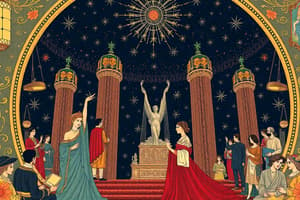Podcast
Questions and Answers
What is a one-party system?
What is a one-party system?
- A government where two political parties compete for power
- A political system that involves independent candidates only
- A system where multiple political parties coexist
- A type of state where a single political party has the right to form the government (correct)
What characterizes a two-party system?
What characterizes a two-party system?
- Multiple parties compete equally for control
- Two major political parties dominate politics (correct)
- Governments with independent organizations
- Only one party controls the government
What is a multiparty system?
What is a multiparty system?
A system where multiple political parties can gain control of government offices.
Define an independent organization.
Define an independent organization.
What is a third party in politics?
What is a third party in politics?
What is a splinter party?
What is a splinter party?
What defines an ideological party?
What defines an ideological party?
What is a single-issue party?
What is a single-issue party?
What characterizes an economic protest party?
What characterizes an economic protest party?
Define a political party.
Define a political party.
What is a major party?
What is a major party?
What is a minor party?
What is a minor party?
What is a coalition?
What is a coalition?
What does consensus mean?
What does consensus mean?
What is split-ticket voting?
What is split-ticket voting?
What is straight-ticket voting?
What is straight-ticket voting?
What is a party machine?
What is a party machine?
Define patronage in politics.
Define patronage in politics.
Flashcards are hidden until you start studying
Study Notes
Political Party Systems
- One-party system: A political structure allowing only one party to govern, based on constitutional provisions.
- Two-party system: Dominated by two major parties; one typically holds a legislative majority (majority party), while the other is the minority party.
- Multiparty system: Multiple political parties can compete for control of government positions, either independently or through coalitions.
Political Party Definitions
- Independent: Refers to organizations that operate without ownership or control by other entities, including the government.
- Third party: A group or individual not primarily involved in a situation, especially during disputes; plays a minor role compared to the two dominant parties.
- Splinter party: A smaller political party that has separated from a larger party, usually due to ideological differences.
- Ideological party: Focuses on specific ideologies and often operates under a different perception of success compared to traditional parties.
- Single-issue party: Centers its campaigns around one specific issue, often struggling to achieve electoral success but attracting dedicated supporters.
Types of Political Parties
- Economic protest party: Emerges from beliefs advocating extreme limitations on government intervention.
- Major party: Has significant impact and influence in national politics, distinct from minor parties that play lesser roles in elections.
- Minor party: Operates alongside major parties but holds a significantly smaller influence in political affairs.
Political Alliances and Voting
- Coalition: A temporary alliance of political groups or parties, often formed to achieve common goals or govern collectively.
- Consensus: A general agreement among groups or individuals, essential in coalition politics.
Voting Practices
- Split-ticket voting: Voters select candidates from different parties on the same ballot, contrasting with straight-ticket voting.
- Straight-ticket voting: All votes are cast for candidates from the same political party across various offices.
Political Organization Dynamics
- Party machine: A centralized party organization, led by a dominant leader or a small group, that effectively controls local or state politics.
- Patronage: The authority to grant government positions or privileges, often used to maintain political favors and influence.
Studying That Suits You
Use AI to generate personalized quizzes and flashcards to suit your learning preferences.




